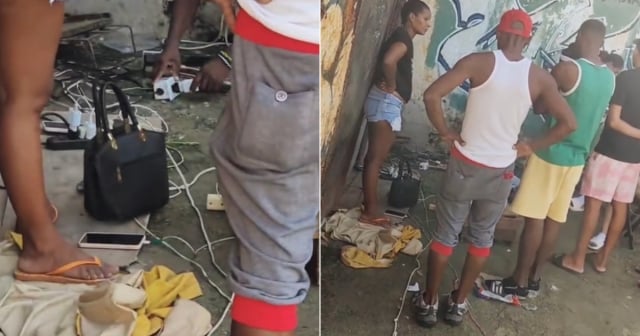The third day of a general blackout in Cuba sparks new protests in Havana and in other regions of the country such as Manicaragua, where the frustration of the residents has reached its peak after several consecutive days without electricity and water.
This energy crisis has caused protests from neighbors to be felt in several areas of the Cuban capital, despite the fear of being repressed, imprisoned, and silenced by the authorities.
Cacerolazos are becoming more frequent in Havana. In the recordings published this Sunday night on social media, shouts of "Down with the Dictatorship," "Freedom," and "We want to be free" can be heard.
Cubans from their homes, from their sidewalks, and sheltered by the darkness of the night that allows them to maintain anonymity, hit their empty pots in municipalities such as El Cerro, Havana del Este, and Marianao.
The shortage of fuel and the collapse of the National Electro-Energy System (SEN) have aggravated the situation on the island, causing blackouts that last for more than 24 hours.
Videos circulating on social media show some protests this weekend, where demonstrators block streets and demand the restoration of electric service.
In some cases, there was a deployment of police forces that attempted to suppress the demonstrations. The government chose to cut off internet access in several areas to prevent the spread of videos.
In addition to the lack of electricity, the shortage of drinking water is another factor that has motivated the people of Havana to protest. In areas like San Francisco de Paula and Marianao, residents have reported going days without water, which has intensified social discontent.
The strategy of cutting off Internet access has been used in previous demonstrations in Cuba. The regime tries to prevent images of the protests from reaching a wider audience and international media.
However, reports on social media continue to show groups of citizens challenging government measures and demanding an immediate solution to the energy crisis affecting the country.
The protests in Havana are just one part of the growing social unrest seen in various regions of the island, where blackouts and a lack of basic resources have left the population in a desperate situation.
Among the most affected regions is the east of the country, which, in addition to being one of the most impoverished areas and having endured blackouts of over 12 hours daily for a longer time, is now suffering from the passage of Hurricane Oscar.
The residents had little information about the arrival of this powerful storm due to the lack of power for several days. There is also no official data on how the regime has proceeded to evacuate those affected.
The ruler Miguel Díaz-Canel said this Sunday, from the National Defense Council (CDN), that he plans to repress citizen protests that may arise due to the collapse of the electric system.
He did not provide any immediate solution to the crisis that his terrible government management has unleashed, but he issued a warning to the population.
"We will not allow anyone to act provocatively causing vandalistic acts, and even less to disturb the peace of our people, and that is a conviction, a principle of our revolution," he stated.
What do you think?
COMMENTFiled under:
